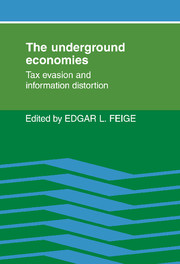Book contents
- Frontmatter
- Contents
- List of contributors
- Preface
- Introduction
- Part I The meaning, measurement, and policy implications of the underground economies
- Part II The underground economy in Western developed nations: measurement in different laboratories
- Part III The underground economy under central planning
- 14 The Soviet second economy in a political and legal perspective
- 15 Second economy and socialism: the Hungarian experience
- Bibliography
14 - The Soviet second economy in a political and legal perspective
Published online by Cambridge University Press: 20 October 2009
- Frontmatter
- Contents
- List of contributors
- Preface
- Introduction
- Part I The meaning, measurement, and policy implications of the underground economies
- Part II The underground economy in Western developed nations: measurement in different laboratories
- Part III The underground economy under central planning
- 14 The Soviet second economy in a political and legal perspective
- 15 Second economy and socialism: the Hungarian experience
- Bibliography
Summary
Official Soviet sources project an image of an economy that is totally centrally controlled: Central planning is comprehensive, and the means of production are in the hands of the state. (The legal distinction between state ownership, cooperative ownership, and social ownership, which is of minor importance in political and economic terms, is disregarded here.) This image is not significantly altered by the official toleration of a modest private sector. It was well known to Western observers that the official economy did not always function as it was supposed to. The criminal code contains several provisions dealing with violations of the established economic system, and the Soviet press regularly reports on prosecutions for such violations and on other abuses of the system. Nonetheless, such incidents did not detract seriously from the overall picture. This began to change only after the opening up of two new channels of information during the last fifteen years: the emergence of a vast reservoir of unofficial (samizdat) sources from the Soviet Union and the arrival of large numbers of Soviet emigrants in the West, many of whom brought with them extensive and intimate knowledge of the functioning of the Soviet economic system. As a result of these developments, the traditional view of the Soviet economy as a system that was planned, owned, and controlled from the center had to be revised. It became customary in this respect to speak of the “second economy” of the Soviet Union, a system that presumably would coexist with and be supplementary to the official, first economy.
- Type
- Chapter
- Information
- The Underground EconomiesTax Evasion and Information Distortion, pp. 297 - 338Publisher: Cambridge University PressPrint publication year: 1989
- 3
- Cited by



